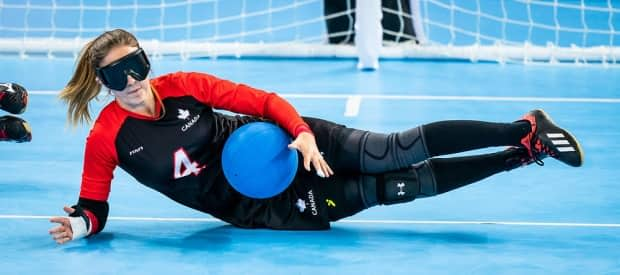Calgary goalball athlete headed to Tokyo as veteran on the team

The Paralympics don't start until Aug. 24, but Canada's goalball team is leaving for Japan on Monday. They're doing a training camp in Sapporo before the Games begin.
For Calgary athlete Meghan Mahon, it's just starting to sink in.
"A year ago, we didn't know if this was going to be something that was going to carry forward. We didn't know what the state of the world would be," she told The Homestretch on Thursday.
"And now we're four days away from leaving, and it's starting to feel very real."
Mahon is a goalball veteran. It's a sport designed specifically for athletes with visual impairment. This will be her second Paralympics after Rio in 2016 — but she's feeling very different this time around.
"I went [to Rio] as a very young, very new athlete … with a team of veterans around me and supporting me, going to basically just be a sponge and be able to absorb anything I could," she said.
"And this time I'm going in … on more of the leadership side of the team."
Though it's still just as exciting, she said there's bit more pressure this time around.
'You want to hear quiet'
Goalball is played on a volleyball court with three players on each side. On each side of the court, the back nine metres are taken up by a net.
The teams throw a three-pound hard rubber ball at each other in a bowling motion that gets up to 55 km/h. A bell inside the ball helps players — who all wear black eyeshades — hear where the ball is going, as they dive to block it from going in the net.

"As much as it's not a contact sport, it's a very physical sport," said Mahon.
"And really all that we're relying on is the communication of our team members on the court because our coaches and the rest of our team on the bench are not able to talk to us during play. And then we're also just relying on hearing the ball."
Before each play starts, the referees will call for quiet in the stands.
"When you walk into your normal sport venue, you hear cheering, you hear clapping, you hear everyone just getting really excited," said Mahon. "When you walk into a goalball venue, you want to hear quiet."
So if there are no spectators allowed at the Games, she said that might not be so bad.
Olympic expectations
Mahon said Canada is heading into the Games as an underdog, having scraped into qualifying. But she said the additional year of practice has been an advantage.
"We've gotten a lot of growth under us in the last year and really just dedicated our time forward," she said.
Almost two years without international competition has left the playing field a little uncertain.
"We are just really going in to do our job and perform to the calibre that we know that we can perform," said Mahon, "and not try to anticipate what other teams are going to do or what other teams think we can do."
With files from The Homestretch.

 Yahoo Movies
Yahoo Movies 